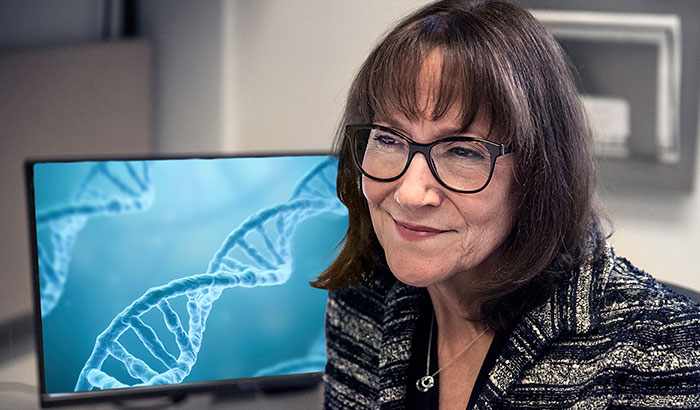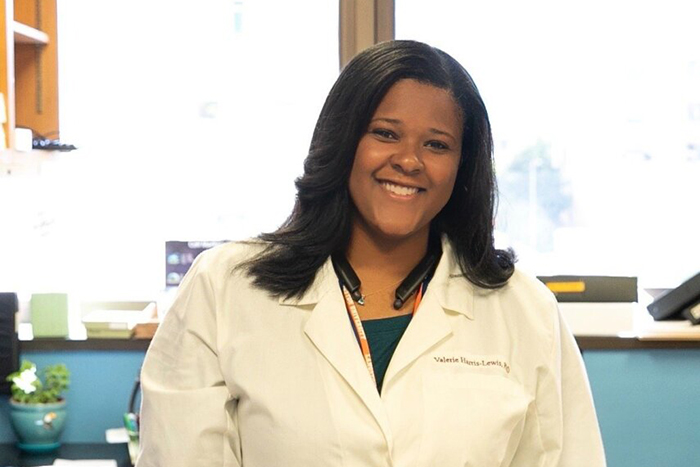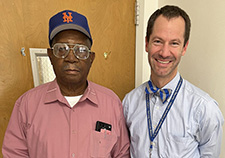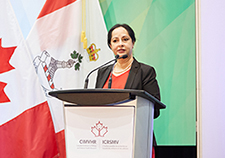Office of Research & Development |
 |
Office of Research & Development |
 |


Dr. Sara Knight studies genomics and personalized medicine, among other areas, at the VA Salt Lake City Health Care System and the University of Utah. (Photo by Tod Peterson)
December 20, 2018
By Mike Richman
VA Research Communications
In recent years, VA has become quite active in studying genomics, the structure, function, editing, and mapping of genes. The agency is now funding more than 100 studies on genetics and its relation to health and diseases.
One of VA’s most ambitious genomic endeavors is the Million Veteran Program (MVP). Vets enrolled in the program provide blood samples to allow for analysis of their genes and give access to their medical records—all so scientists can pinpoint the role genes play in diseases and health. Genetic data of the more than 700,000 Veterans enrolled in MVP has been used to study such medical issues affecting Veterans as mental illness, heart disease, PTSD, and Gulf War illness.
What if that information can be applied in a different way? What if Veterans can see their results and share them with a provider who may suggest a treatment for an illness linked to the genetic information?
"This study starts to define what the Veterans want and under what conditions they want it."
Dr. Sara Knight of the VA Salt Lake City Health Care System is exploring those questions. She’s leading a study that aims to find out if Vets want their results returned, why they’d want them returned, and what details they’d want to see and under what circumstances. The findings will help guide VA executives in how to disclose to Veterans the results of whole genome sequencing, the process of learning the complete DNA sequence of a person’s set of genes at one time, and other genome-based tests, she says.
Currently, MVP does not return genetic results to enrollees, for several reasons.
“There’s an urgent need to know this information, but we just don’t understand what Veterans want,” says Knight, who is also a professor at the University of Utah. “That’s what this study will find out about and document. With that evidence, we can go to VA policymakers and say, `We have great interest among Veterans, but they need some things to occur when they get the results back. They need to be able to talk to someone who has knowledge of genetics and can help them understand the results.’ This study starts to define what the Veterans want and under what conditions they want it.”

VA investigator brings diversity into autoimmune disease research

Veterans help find new cancer treatments

Million Veteran Program director speaks at international forum
The U.S. National Institutes of Health (NIH) describes genomic medicine as an “emerging medical discipline” that involves using genomic information about a person as part of his or her clinical care, including for diagnostic and therapeutic decision-making. Genomic medicine has made an impact in the fields of oncology, pharmacology, rare and undiagnosed diseases, and infectious disease, according to NIH.
To MVP Director Dr. Sumitra Muralidhar, knowing Veterans’ thoughts on the return of their research results is very important, as is allowing Vets to choose whether to receive that information.
She points out that the topic has been discussed since MVP was launched in 2011, including at meetings of the VA Genomic Medicine Program Advisory Committee, which advises the VA secretary. Currently, VA is planning pilot studies in the areas of prostate cancer and high cholesterol in families to better understand the questions tied to giving back that information, she says.
“In our ad-hoc discussions with Veterans on this subject, we’ve had some that are very interested in getting their genetic results, especially if it has a bearing on their health,” Muralidhar says. “Other Veterans don’t want to know their genetic results, and still others worry that their VA benefits may be affected if they have positive results for certain illnesses.”
The return of non-genomic research results to study participants is nothing new. In fact, as Knight explains, researchers often ask participants if they want to receive their results. She says researchers have been allowed to return findings from clinical and non-clinical studies if the participants are interested in seeing them, and if they agree to being re-contacted by the researchers to receive the results at the end of the study. The return of non-clinical results often requires that the researcher have the permission of the institutional review board that oversees the study, as well as the informed consent of the participants.
Some participants may want to see their results even if they know the meaning isn’t clear, Knight adds.
The concept of returning individual genomic results, which is relatively new to the research community, triggers a different set of concerns. Genetic results can be much harder to understand than other research results because of the possible uncertainty of what they mean, Knight says. Also, the return of individual genomic results that are expected to have little clinical meaning to the research participant isn’t universally accepted. It’s more accepted to return results that show a change in a gene that’s linked to a treatable condition, she notes.
“A lot of times with a medical test,” Knight says, “you learn that you have or don’t have a condition or disease, and that there may be some possibility of error. It’s simpler than whole genome sequencing and other kinds of genome sequencing, where you may have more complicated results. Those results may tell you about your risks for a condition for which no treatment exists. They may also say you have only a very small chance of having a specific diagnosis, but you may not want to be concerned about that small risk.
“The results may also note that there’s a change in a gene,” she adds. “But with our current science, we don’t know if the change is linked to any specific condition or disease. You also may get results from genome sequencing that indicate a different condition or disease than what you and doctors were looking for in the first place.
“That’s where Veterans might say, `I don’t want to know about that gene that changed. I don’t want to worry about it.’ But others might say, `I want to know about it now, and when you have a treatment for it or when you know what it means, I want you to re-contact me.’ You can see the dilemma that creates for research. We just don’t know how people feel about these things at this point.”
Currently, Knight and her colleagues are recruiting Veterans for her study. They aim to enroll nearly 4,000 participants, a total that is based on a calculation of the sample size needed to represent the approximately 6.4 million Veterans cared for in VA in 2016. The sample will also show the diversity of the VA population in terms of race, age, and other demographic factors. For instance, it will reflect the fact that 15 percent of the Veterans cared for in VA in 2016 were black and 68 percent were white, according to Knight. Being an MVP enrollee isn’t a criterion for inclusion.
“The importance of this random sample is not that we’re going to be testing people randomly,” she says. “It’s that we’re going to be selecting Veterans regardless of whether they’re homeless or whether they’re a Veteran with high education. We’re going to be sampling people, Veterans who are in all walks of life, all income levels, all kinds of living situations. We’re going to get a large representative sample.”
In recent months, Knight and her team have led focus groups at VA medical centers to gauge Veterans’ opinions on the return of research results. Such information will be used to frame the questions in a survey that will be distributed to the random sample.
In the focus groups, the researchers usually show the Veterans a scenario that involves genome sequencing, such as a patient speaking with a doctor who recommends that genetic information be used to diagnose a condition or disease. The researchers then ask questions like the ones that will be included in the survey:
Knight estimates that about 2,000 of the surveys will be completed. That should be enough to reach a conclusion about Veteran preferences on genome sequencing results that reflects the opinions of the Veteran community, she says.
Final results will be available in 2021. After they are published, Knight plans to convene a meeting in Washington, D.C., that will focus on how to interpret the meaning of the study results in relation to returning them to Veterans. The meeting will include VA leaders from operations and policy offices, including specialty care, primary care, laboratory testing, oncology, genomic medicine, cardiology, and neurology. VA clinicians and service chiefs will also be expected to attend.
“Together, we’ll work on understanding the results and how they should best be used to inform VA policy,” she says.
Knight’s study won’t explore the ethical questions that often surface in relation to returning results to study participants. Essentially, is the research community obligated to return those results out of respect for those who helped create them in the first place? She notes, however, that her findings will help “inform” that ethical debate by providing information about the results Veterans would like to receive.
“Right now, we can debate these things all we want,” she says. “But it may be that what we think people should get isn’t what they want. What if they want more information than we feel they should get? That’s something we need to get a handle on. If there’s a lot of enthusiasm for hearing about all kinds of results, then we might say to the ethicists that it looks like Veterans really want to know more than what we’ve been thinking they should receive. Should we think about expanding our view of what people should get back?”
The ethical question is discussed in a July 2018 report on returning individual research results to participants that was published by the National Academies of Science, Engineering, and Medicine. The non-governmental group provides research and recommendations on public health and science policy.
The authors, all of whom were from the academic community, strongly support returning some results in many situations beyond traditional and current practices.
“There are certain circumstances when there are compelling reasons to return individual results to participants,” the researchers write, “and others in which it is appropriate to limit and constrain the return of results. In determining whether to return results for any given study, the various ethical principles must be balanced, and the specific context of the situation must be carefully considered.”
Knight agrees with that assessment.
“The context of the situation must be considered carefully in the return of results to research participants,” she says. “One factor to consider is the participants’ preferences for receiving the results, whether it’s the type of results they want returned or it’s the health professionals who they want to help them understand and use the results. We’ll be working to uncover that important information.”
Returning genetic results to research participants can be an arduous process. Dr. Sumitra Muralidhar, the director of VA’s Million Veteran Program, explains that a series of steps need to be taken from the outset of a study, far in advance of when patients receive their results down the road.
For one, the results must be validated so they comply with the Clinical Laboratory Improvement Amendments (CLIA) of 1988, which sets guidelines for laboratory testing to ensure the accuracy, reliability, and timeliness of patient results. The tests have to be done in a lab that is CLIA-certified or that meets CLIA quality standards, a step that must be arranged at the outset of the study.
Research genetic testing is usually not done in CLIA labs. “That’s the reason we need to validate the test results in compliance with CLIA before we return the results to be used in clinical decision-making,” Muralidhar says.
Plus, she adds, Veterans who agree to receive results need to have access to pre- and-or post-genetic counseling. In pre-counseling, participants are informed about the genetic test they are about to undergo and the implications for their health and that of their families. Post-counseling explains what the result means and the options the patient has in terms of care. Treatment options are not available for all genetic results that signal a health complication, she notes.
Muralidhar also indicates that study and program leaders must make sure the Veterans’ providers and the health care system, in general, are equipped to interpret the genetic test results, and that they know how to incorporate them into the patient’s health care. “Interpretation of the results is critical,” she says. “A negative result does not always imply lack of risk for a disease because the test may not have included a specific genetic variant.”
Dr. Sara Knight of the Salt Lake City VA adds that the process of returning results from genome sequencing can be lengthy and time-consuming. She’s currently leading a study that is exploring Veteran opinions on the return of genetic test results (see main story).
“The genetic test involves several steps of validation and interpretation before the results can be returned,” she says. “In addition, clinical geneticists and genetic counselors who return the results must carefully consider the age and life context of the person who will receive them, as well as the implications of the results for family members. The length of the process, and the uncertainty about what the results may mean can be difficult for people who are waiting. The whole process isn’t easy.”
--- Mike Richman
VA Research Currents archives || Sign up for VA Research updates